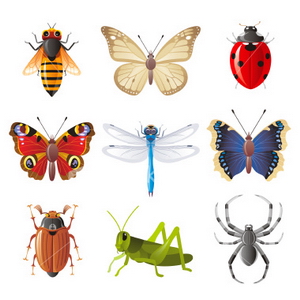Many insects are considered to be pests by humans. However, insects are also very important for numerous reasons. Insects can be found in every environment on Earth. While a select few insects, such as the Arctic Wooly Bear Moth, live in the harsh Arctic climate, the majority of insects are found in the warm and moist tropics. Insects have adapted to a broad range of habitats, successfully finding their own niche, because they will eat almost any substance that has nutritional value. Insects are crucial components of many ecosystems, where they perform many important functions. They aerate the soil, pollinate blossoms, and control insect and plant pests. Many insects, especially beetles, are scavengers, feeding on dead animals and fallen trees, thereby recycling nutrients back into the soil. As decomposers, insects help create top soil, the nutrient-rich layer of soil that helps plants grow. Burrowing bugs, such as ants and beetles, dig tunnels that provide channels for water, benefiting plants. Bees, wasps, butterflies, and ants pollinate flowering plants. Gardeners love the big-eyed bug and praying mantis because they control the size of certain insect populations, such as aphids and caterpillars, which feed on new plant growth. Finally, all insects fertilize the soil with the nutrients from their droppings. Bees are important pollinators of flowering plants.
Economic Importance
Insects have tremendous economic importance. Some insects produce useful substances, such as honey, wax, lacquer, and silk. Honeybees have been raised by humans for thousands of years for honey. The silkworm greatly affected human history. When the Chinese used worms to develop silk, the silk trade connected China to the rest of the world. Adult insects, such as crickets, as well as insect larvae, are also commonly used as fishing bait.
Insects as Food
Insects, of course, are not just eaten by people. Insects are the sole food source for many amphibians, reptiles, birds, and mammals, making their roles in food chains and food webs extremely important. It is possible that food webs could collapse if insect populations decline.
In some parts of the world, insects are used for food by humans. Insects are a rich source of protein, vitamins, and minerals, and are prized as delicacies in many third-world countries. In fact, it is difficult to find an insect that is not eaten in one form or another by people. Among the most popular are cicadas, locusts, mantises, grubs, caterpillars, crickets, ants, and wasps. Many people support this idea to provide a source of protein in human nutrition. From South America to Japan, people eat roasted insects, like grasshoppers or beetles.
Insects in Medicine
Insects have also been used in medicine. In the past, fly larvae (maggots) were used to treat wounds to prevent or stop gangrene. Gangrene is caused by infection of dead flesh. Maggots only eat dead flesh, so when they are placed on the dead flesh of humans, they actually clean the wound and can prevent infection. Some hospitals still use this type of treatment.
Source:
CK-12, April 2016
http://www.ck12.org/life-science/Importance-of-Insects-in-Life-Science/…

- Login om te reageren
